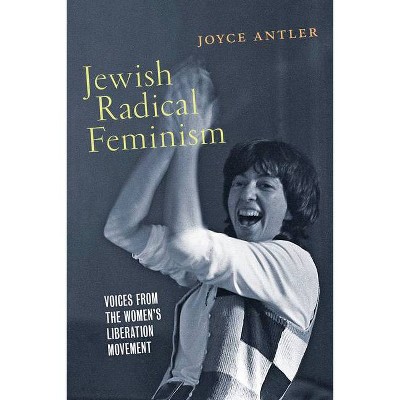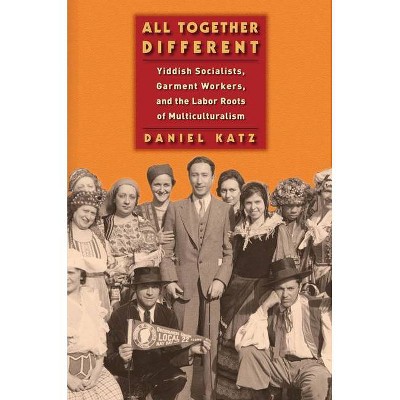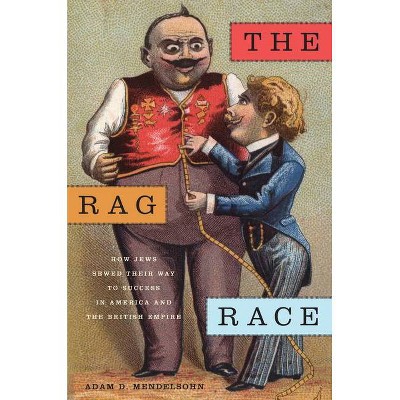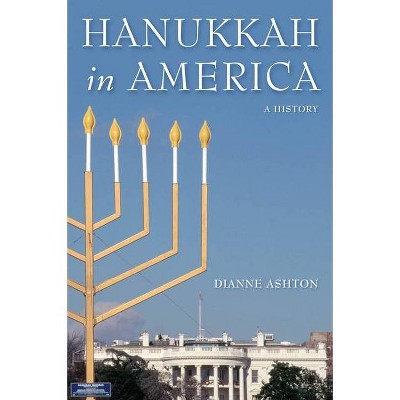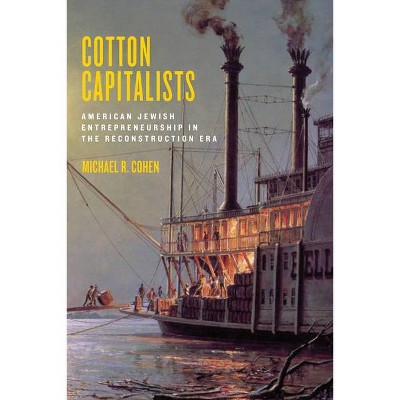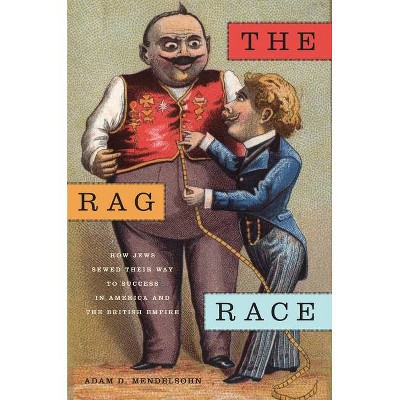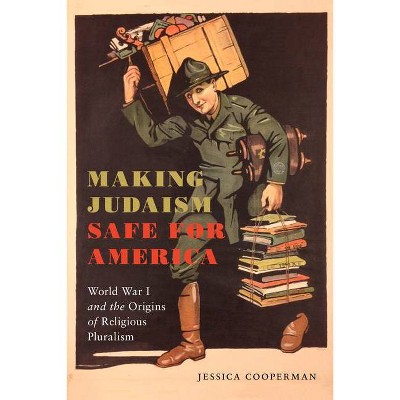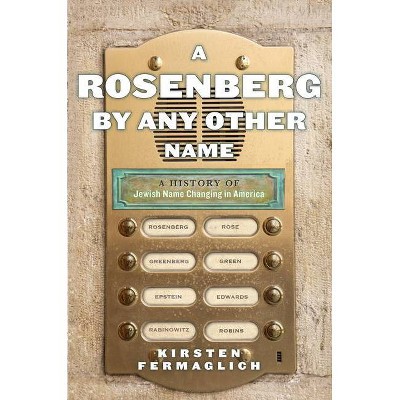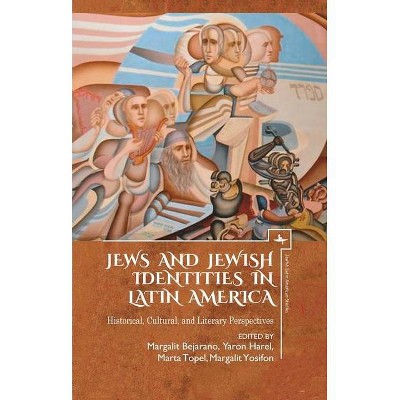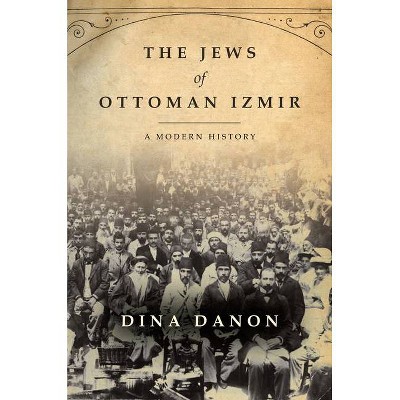Jews and Booze - (Goldstein-Goren American Jewish History) by Marni Davis (Paperback)
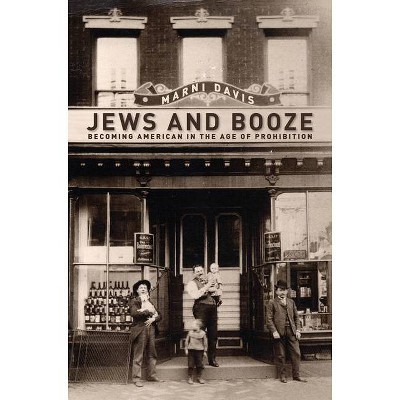
Similar Products
Products of same category from the store
AllProduct info
<p/><br></br><p><b> Book Synopsis </b></p></br></br>- "A provocative study." - <em>Publishers Weekly</em></p> - "A fascinating, nuanced social history." - <em>Kirkus</em></p> - "Lively, well-researched, and comprehensive." - Jonathan D. Sarna, author of <em>American Judaism</em></p> - "Imaginatively conceived, fiercely researched, beautifully written." - Stephen J. Whitfield, author <em>In Search of American Jewish Culture</em></p> - "Groundbreaking study... deftly blends social and cultural history." - Tony Michels, author of <em>A Fire in Their Hearts</em></p> - "Engrossing and well-written." - <em>Jewish Book Council</em></p> - "Thoughtful, instructive, and often insightful." - <em>The New York Times Book Review</em></p> - "A comprehensive look at a little-discussed historical subject." - Jenny Hendrix, <em>Forward</em></p> - "Fascinating, academically sophisticated, and superbly written." - <em>Tablet</em> Magazine</p> - "Informative and entertaining." - Glen C. Altschuler, <em>San Francisco Chronicle</em></p> - "Touches on a most important topic... fascinating work." - David Geffen, <em>International Jerusalem Post</em></p> - "Interesting, anecdotes, facts and figures... charming history to make the reader thirsty for another round." - Evan Rail, <em>Times Literary Supplement</em></p> "An excellent book... A complex and sophisticated narrative." - <em>Journal of American History</em><p/><br></br><p><b> Review Quotes </b></p></br></br><br>Davis has succeeded in depicting the trials and tribulations of many Jewish immigrants as they adapted to life in the United States.--Morton I. Teicher "The Jewish Chronicle"<br><br>[This reviewer] has always been amazed at the ability of academics to take inherently interesting subjects, like TV and sex, and make them incredibly boring. Davis manages to avoid this, producing an account which is at once both highly readable and yet still approaches the subject in a sophisticated manner.-- "Heeb Magazine"<br><br>A comprehensive look at a little-discussed historical subject that can't help but have a spring in its step.--Jenny Hendrix "Forward"<br><br>A pioneering study of Jews and the American trade in alcohol from entrepreneurial 19th century immigrants through 20th century battles over prohibition. Lively, well-researched, and comprehensive, this will long stand as the definitive study of Jews, booze, and evolving American taboos.--Jonathan D. Sarna, author of American Judaism: A History<br><br>Beginning with the mid-nineteenth century, Davis provides a solidly documented study of Jewish participation in the American alcohol industry, and she carefully verifies her stories with specific examples from many sections of the country. Furthermore, she shows that the alcohol industry provided an avenue of acculturation first of German Jewish immigrants and later of Eastern European Jewish immigrants . . . . [I]t presents a solidly researched and well-documented history in a field that has been overlooked by Jewish studies.--Kay Goldman "Yearbook of German-American Studies"<br><br>Davis has significantly enhanced our understanding of Jewish acculturation in the United States.-- "Journal of American Ethnic History"<br><br>Davis's book offers a unique keyhole into the Jewish immigration experience.--David Rosen "Brooklyn Rail"<br><br>Engrossing and well-written.-- "Jewish Book Council"<br><br>Every Jew should read Jews and Boozebecause it touches on a most important topicwhat can happen when the challenge of maintaining tradition, on the one hand, and fostering entrepreneurship, on the other hand, is greatly heightened.--David Geffen "Jerusalem Post"<br><br>Focusing on Americas late-nineteenth-century temperance movement and the passage into law of the Eighteenth Amendment establishing Prohibition in 1919, Davis illuminates the dilemma facing many American Jews of the time: the desire to maintain traditions often livelihoods or to assimilate further into mainstream society . . .Jews and Booze is an academic text, without a strong narrative or a central character. A couple of repetitions, like the noxious quote from Henry Ford the Jews are on the side of liquor and always have been slow things down occasionally, but there are enough interesting anecdotes, facts and figures in the charming history to make the reader thirsty for another round.--Evan Rail "Times Literary Supplement"<br><br>Imaginatively conceived, fiercely researched, beautifully written, Jews and Booze is welcome news indeed. A very talented and promising historian has shown how a contentious slice of the American Jewish past can remain important to today's readersand has made a particular conflict between Protestant moralism and ethnic habits her own--Stephen J. Whitfield, author of In Search of American Jewish Culture<br><br>In her debut, Davis suggests that anti-Semitism and Prohibition were parallel expressions of political disquiet during the turn of the last century . . . A fascinating, nuanced social history.-- "Kirkus"<br><br>In his multilayered book, Davis (Georgia State Univ.) explores the braided nature of the temperance movement, assimilation, ethnicity, immigration, nativism, wartime fervor, and postwar intemperance. The alcohol trade enabled some Jews to acquire economic power and social standing before the Prohibition movement, and the Volstead Act caused more non-Jews to question that very involvement. Jews themselves reacted differently to attempts to restrict or prohibit alcohol, while the perception of Jews held by others underwent transformation as well. In cities like Cincinnati and Louisville, the alcohol industry had proved economically nurturing, affording entrepreneurial opportunities for Jews and allowing for the promotion of institutions such as Hebrew Union College. Toward the close of the 19th century amid mass migration of Jews from czarist Russia, anti-Semitism and discrimination practices heightened. While striving to prove themselves as both Jews and Americans, Jews contested prohibitory measures they considered contrary to American freedom and individualism. Having attained a reputation for moderation regarding alcohol consumption, Jews had to contend with growing associations involving immigration, liquor, and criminality, particularly during the Prohibition era, when Jewish mobster Meyer Lansky helped to found the organized crime syndicate. The perplexity of how to respond to Prohibition only ended when the 'Great Experiment' did.--R.C. Cottrell "CHOICE"<br><br>In this groundbreaking study, Davis deftly blends social and cultural history to uncover the important role American Jews played in the liquor trade, and the hostilities they elicited. In recovering this nearly forgotten past, Jews and Booze provides a prism through which to view the difficulties of Americanization.--Tony Michels, author of A Fire in Their Hearts: Yiddish Socialists in New York<br><br>It was probably inevitable that someone had to ask if Prohibition was good for the Jews. Sure enough, Marni Davis has come along not only to raise the question but also to provide intriguing answers inJews and Booze.-- "Moment Magazine"<br><br>Jews and Booze is an excellent piece of academic research on a serious subject, written superbly, which is entertaining, enlightening and engaging.--Tim Holt "Brewery History"<br><br>Jews and Booze is thorough and well-researched.-- "The Weekly Standard"<br><br>Jews and Booze tells many important stories and recognizes the diversity and complexity of American Jewish experience.--Wendy Bergoffen "H-Net Reviews"<br><br>Jews and Boozetouches on a most important topicwhat can happen when the challenge of maintaining tradition, on the one hand, fostering entrepreneurship, on the other hand, is greatly heightened . . . this [is a] fascinating work.--David Geffen "International Jerusalem Post"<br><br>Marni Davis had me with the title of her book, Jews and Booze. But the book itself, an academic monograph that is also highly readable, is an eye-opener.-- "Jewish Journal"<br><br>The author does an excellent job of delving into the Jewish community.--Kevin Winter "City Book Review"<br><br>The best kind of historysurprising, authoritative, and written with both acuity and charm. I loved this book.--Daniel Okrent, author of Last Call: The Rise and Fall of Prohibition<br><br>The book deserves a wide audience for its creative inquiry and suggestive approach to American immigration and ethnic history.-- "American Historical Review"<br><br>This book is an important addition to the literature of cultural conflict in American history.--K. Austin Kerr "American Jewish Archives Journal"<br><br>This fascinating, academically sophisticated, and superbly written exposition of the intricate, often precarious, role that Jews played in every aspect of the American alcohol industryfrom production in industrial stills to retail sale in bars and speakeasies across the land, and finally to bootlegging, a crime that created the fortunes of some of North Americas most prominent Jewish philanthropic familiesturns out to be a wonderful historical companion to HBOs most explosive series since The Sopranos and to the recent PBS airing of Ken Burns documentary Prohibition.More important, Jews and Booze is a major contribution to the economic history of the Jews in the United States. The book also offers an original and rich exposition of the social and political importance of alcoholparticularly the puritanical fear and loathing of itin the development of anti-immigration and anti-Semitic sentiments in late 19th- and early 20th-century America.-- "Tablet Magazine"<br><br>This is an excellent book. Davis crafted a complex and sophisticated narrative, weaving a variety of themes together into an argumentative arc that demonstrates the complex relationships between prohibition and the development of three generations in American Jewish life.-- "Journal of American History"<br><br>Using census data and other primary documents, Davis brings to life the stories of Jewish saloon keepers, rabbis, and alcohol producers faced with the temperance movement and increased anti-Semitism. While much has been written about the temperance movement and Prohibition, Davis focuses uniquely on the implications and impact of this period on one ethnic and religious population. Recommended to readers studying aspects of turn-of-the-century immigration or temperance, Prohibition, or Jewish studies.--Karen Okamoto "Library Journal"<br>
Price History
Price Archive shows prices from various stores, lets you see history and find the cheapest. There is no actual sale on the website. For all support, inquiry and suggestion messagescommunication@pricearchive.us
